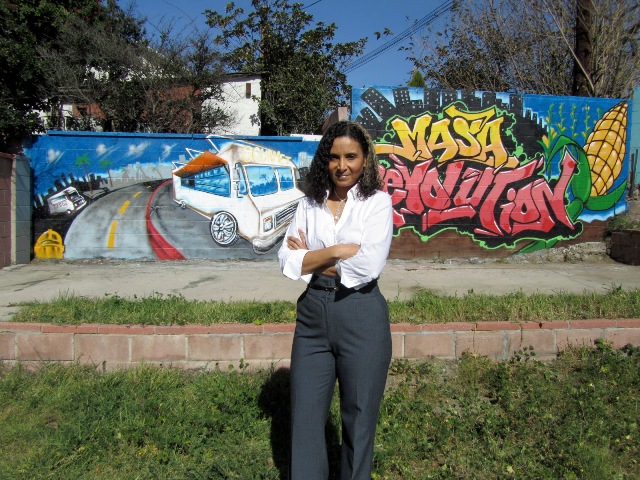LOS ANGELES, CA – At first glance, Masa Revolution is a bilingual documentary about the evolution of food truck eats- from masa-based tamales and tacos to gourmet burgers and sushi. But viewers will soon realize that the story is about entrepreneurs chasing the American dream, changing attitudes around cultural differences, and social media’s role in this modern-day revolution.
Nicknamed “Roach Coaches” for many years, catering trucks have a rich, yet slightly negative history in Southern California. Hispanic immigrants, mostly Mexican, still dominate the industry. They use recipes, ingredients and sauces from their hometown to prepare tacos, burritos and tostadas in their adopted L.A. neighborhoods. Masa Revolution travels to Mexico to show the influence of Mexican street food in L.A. and profiles the GRILL EM ALL gourmet food truck to show how food truck cuisine is changing.
The film explores our appetite for breaking bread in social settings: Tribal family feasts, communal taco stands, and, now, the flashmob-esque world of gourmet food trucks — sharing mealtime in the proverbial melting pot that is L.A. with people you otherwise wouldn’t get to meet, in public spaces you probably would’ve never imagined.
Masa Revolution takes you behind the “order here” window of trucks for a close-up look at some of L.A.’s most popular food truck meals: Park Banh Mi and fusion Korean tacos to Indian Dosa and Shrimp Creole. The film introduces you to both sides of L.A.’s food truck revolution: Immigrants fighting for social justice and a hipster-centric status quo rebellion. The industry is split along cultural, social and economic lines. Loncheras (traditional taco trucks) on one side. Gourmet trucks on the other. They have opposite ways of doing business, but are governed by a singular set of laws. L.A. City and County politicians face the daunting challenge of adopting regulations that are fair to everyone in the food business, including brick and mortar eateries. The battles are contentious. Restaurant operators complain that entrepreneurial chefs with trucks have less overhead, offer competitive cuisine for a lower price, and steal customers. Gourmet truck operators say it’s a free market.
Eating is universal. Masa Revolution goes beyond what we put in our mouths to explore the politics, policies and processes that influence the accessibility or limitation of affordable street food. The film also highlights some creative mobile businesses, including the green greasy truck that runs off its own recycled oil, Frysmith; the Mens salon on wheels, The Original Mobile Barber Shop Co.; and le fashion truck where two young designers offer a jeans, dresses and jewelry for women!
Find the Masa Revolution website <here>




